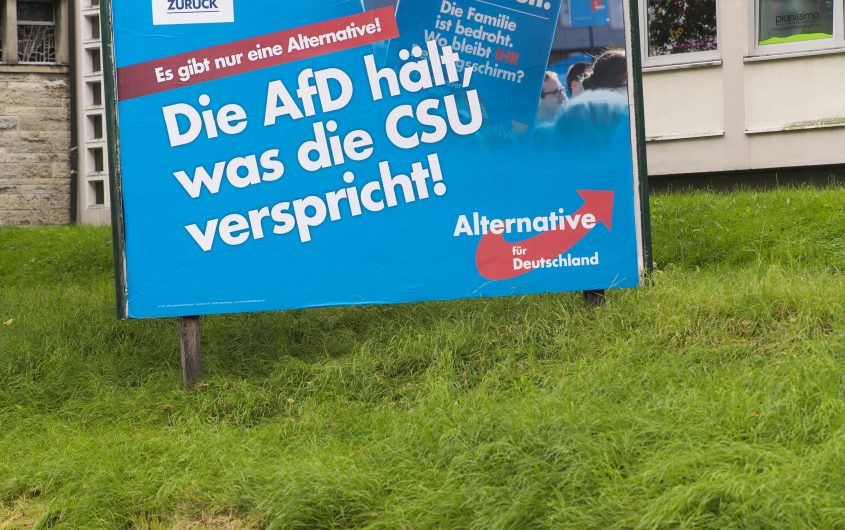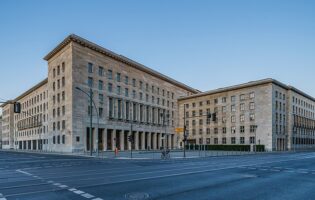
Markus Spiske via Flickr
The Christian Democrats and the Alternative for Germany

Sarah Wiliarty
Wesleyan University
Sarah Elise Wiliarty is Associate Professor of Government at Wesleyan University in Middletown, Connecticut. She received her B.A. from Harvard and her PhD from the University of California, Berkeley. Her research focuses on European politics, women in politics, political parties, energy policy in Europe, and political leadership. Her scholarship has appeared in journals such as German Politics, German Politics and Society, and Politics and Gender. She is the author of The CDU and the Politics of Gender in Germany: Bringing Women to the Party (Cambridge University Press). Her forthcoming book chapter “How the Christian Democrats Manage to Adapt to the Silent Counter-Revolution” examines the CDU/CSU response to the rise of the Alternative for Germany.
The Cost of Continued Moderation
171. This is the real effect of the Alternative for Germany.
Normally political parties in Germany take only a few days to form a governing coalition after an election. After the 2017 federal election, the parties needed 171 days to decide to continue the current Grand Coalition government, an arrangement no one seemed particularly keen on. With the addition of the AfD to the Bundestag, however, the mainstream parties have found it difficult to find a coalition that worked both politically and mathematically. Because the AfD is unlikely to fade away, this problem will probably continue through the 2021 national election and beyond.
It is dubious that the AfD will “win” an election if we define “winning” as entering the governing coalition. The AfD is represented in the Bundestag and all sixteen state legislatures, but it is not in a single government. However, the party is influencing German politics in other ways. The election of Thomas Kemmerich (FDP) to Minister-President of Thuringia, with the support of both the CDU and the AfD, caused a scandal that led to the resignation of several top-level CDU politicians, including Merkel’s chosen successor, Annegret Kramp-Karrenbauer. Leaning on the support of the AfD’s votes is poison to candidates and their parties alike. Yet, the 2017 national election and the events in Thuringia also reveal how complicated coalition formation has become and is likely to remain with six parties in play in the German system (seven if the CDU and CSU are counted separately).
Is the AfD here to stay? Historically Christian Democrats have pledged to keep their party conservative enough that no political tendency could emerge to their right. The idea behind this strategy was to ensure that conservative voters in Germany had a home in a democratically-legitimated party. By bringing conservative citizens into the democratic fold, Christian Democratic leaders hoped to prevent the rise of a radical right party. Other factors that prevented the rise of a radical right contender included the ability of the government to ban extremist parties and the tendency of radical right movements to splinter over differences among party leaders about how extreme the party should become. The Federal Office for the Protection of the Constitution continues to monitor the AfD and in fact, has recently upgraded its level of surveillance (although a German court recently suspended the right to do so, pending the outcome of a legal challenge to the decision). The AfD continues to be divided about both choice of leaders and policy direction. But the Christian Democrats have moved to the center of the political spectrum, allowing a political opening to their right. What has changed in the German political landscape is the position of the CDU.
Under Chancellor Merkel, the CDU has become more moderate. The CDU has become more open to non-traditional gender roles, with increased financial support for working mothers and rhetoric to include new forms of family. After Fukushima, the Christian Democrats committed to phasing out nuclear energy. The CDU had become more open to immigration, even prior to the 2015 refugee crisis. The Christian Democratic shift to more moderate stances on these social and cultural issues has likely helped the party win votes. But with these policy shifts, Merkel has turned her back on the long-standing promise not to allow the emergence of a party to the right of the Christian Democrats. The AfD has been eager to fill the resulting political space.
One question to consider is whether a post-Merkel CDU might move back to the right. Several factors point against that potential development. First, at the CDU party congress in January, delegates elected Armin Laschet, the Minister-President of North-Rhine Westphalia over Friedrich Merz. Laschet is expected to continue Merkel’s moderate course, whereas Merz would have signaled a shift to the right. The CDU’s party members prefer continued moderation to a rightward swing.
Laschet will not automatically become the Christian Democratic Chancellor candidate. The CDU and the more conservative CSU will decide on a joint candidate sometime this spring. Laschet’s only major competitor is Markus Söder, Minister-President of Bavaria. Söder was Germany’s second most popular politician in February 2021, behind Merkel, but well ahead of Laschet.
Historically, Söder was seen as a more conservative candidate than Laschet. At one point in time, the choice of Söder might have signaled a move to the right, but that perspective no longer holds true. Söder strongly opposed Merkel’s policies on admitting refugees in the lead-up to the 2018 Bavarian elections, but more recently, he has softened his stance. He and Merkel have also generally seen eye-to-eye on how to handle the pandemic. Even if Söder does become the Christian Democratic Chancellor candidate, it won’t signal a rightwards turn.
Finally, looking to possible outcomes of the September 2021 national election, a Christian Democratic-Green coalition is a real possibility. Söder draws connections between his Christianity to environmentalism, making him a solid potential partner for the Greens. But regardless of who the Christian Democrats choose as their Chancellor candidate, the desire to remain open to a coalition with the Green party will prevent a pivot to more a conservative position.
Under Merkel’s guidance, the CDU moved away from its historical commitment to prevent the emergence of a competitor on the party’s right flank. But given that this change has been successful at the polls, the Christian Democrats are likely to continue on the more moderate path set forth by Merkel rather than reverting to the more conservative vision of the past. The opening in the party system that the AfD has taken advantage of will probably remain.
The future of the AfD itself is difficult to discern. The AfD’s main issue of immigration is largely off the table at the moment. On the other hand, the AfD’s criticisms of the government’s handling of the pandemic may attract voters frustrated with continued lockdown measures that don’t appear effective. In short, many questions remain open about the future of the AfD. One development that might shut the party down – a move of the Christian Democrats to the right – does not seem likely. The AfD’s political space will probably remain open and the party will continue to fill it.








